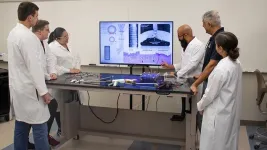(Press-News.org) A common, cat-borne parasite already associated with risk-taking behavior and mental illness in humans may also contribute to exhaustion, loss of muscle mass, and other signs of “frailty” in older adults, suggests a study published Nov. 6 in the Journal of Gerontology: Medical Science.
The research, by an international team of scientists including University of Colorado Boulder, University of Maryland School of Medicine and the University of A Coruña in Spain, is the latest to explore how the tiny, single-celled organism Toxoplasma gondii (T. gondii) could have big impacts on human health.
“We often think of T. gondii infection as relatively asymptomatic, but this study highlights that for some people it may have significant health consequences later on,” said co-author Christopher Lowry, a professor in the Department of Integrative Physiology at CU Boulder.
Approximately 11% to 15% of people in the U.S. have been infected with T. gondii at some point and rates tend to be far higher in older individuals. In some countries, more than 65% have been infected. Once infected, people can unknowingly harbor the parasite for life.
For the study, the team examined the blood of 601 Spanish and Portuguese adults over 65, along with measures of a common geriatric syndrome known as “frailty” – which includes unintentional weight loss, tiredeness, loss of cognitive sharpness and other indications of declining health.
A whopping 67% of study subjects were “seropositive” showing markers in their blood of a latent infection.
The researchers did not, as they originally hypothesized, find an association between any infection to T. gondii and frailty. But they did find that, among those infected, those with higher “serointensity” or a higher concentration of antibodies to the parasite, were significantly more likely to be frail.
Higher serointensity could reflect a more virulent or widespread infection, multiple infections or recent reactivation of a latent infection, the authors said.
“This paper is important because it provides, for the first time, evidence of the existence of a link between frailty in older adults and intensity of the response to T. gondii infection,” said co-author Blanca Laffon, a professor of psychobiology at the Interdisciplinary Centre of Chemistry and Biology at University of A Coruña.
How cats spread T. gondii
Wild and domestic felines are considered the definitive host of the parasite, while warm-blooded animals like birds and rodents serve as secondary hosts: When cats eat infected animals, T. gondii takes up residence and multiplies in their intestines, shedding eggs in their feces.
People are typically infected via exposure to those eggs (via litter boxes, contaminated water or dirty vegetables) or by eating undercooked pork, lamb or other meat that’s infested.
Most people never know they’ve been infected, with only about 10% initially having brief flu-like symptoms. But T. gondii tends to linger dormant for decades, cloaked in cysts in muscle and brain tissue (specifically the emotion-processing region known as the amygdala) with some insidious impacts, mounting research suggests.
In a creepy evolutionary trick seemingly designed to benefit the parasite’s favorite host, rodents infected with T. gondii tend to lose their fear of felines, making it easier for cats to catch rats and mice. In the wild, infected chimpanzees have been shown to actually grow attracted to the smell of the urine of their feline predator, the leopard.
People who have been infected also tend to engage in risky behavior, with research showing they tend to be more impulsive, more entrepreneurial and more likely to get in a car accident. They also have higher rates of schizophrenia, certain mood disorders, cognitive problems and are more likely to attempt suicide, according to research by Lowry and Dr. Teodor Postolache, a professor in the Department of Psychiatry at University of Maryland School of Medicine and senior author on the new study.
A declining immune response?
The authors caution that the new study does not prove that exposure to T. gondii causes frailty, but rather identifies a compelling association that warrants further study.
They found that frail people with high T. gondii seropositivity also had higher levels of certain inflammatory markers, suggesting that infection with the parasite could exacerbate inflammation that already occurs with aging — a.k.a. “inflammaging.”
Because latent T. gondii tends to hide out in muscle tissue, Postolache suspects it could also play a role in hastening sarcopenia, or age-related muscle wasting.
Lowry’s research centers around the impact microorganisms have on the immune system and, thus, mental health. He notes that many microbes that humans have evolved with impact health in a positive way — a theory known as the Old Friends hypothesis.
Even T. gondii may have health benefits we aren’t yet aware of, he said.
But in some cases, a switch flips, and friends become enemies.
In the case of T. gondii, certain medications or immune compromising diseases like HIV or cancer can enable a latent infection to escape suppression and reactivate, with adverse effects. Even in people with healthy immune systems, Lowry notes, immune function can decline with age, potentially enabling dormant T. gondii to rear up.
The researchers hope their study will inspire more research into the relationship between T. gondii and frailty, and ultimately lead to new ways of keeping the parasite from doing harm.
For now, they encourage people—especially pregnant and immune compromised people— to take steps to avoid infection.
Tips for preventing infection:
Change litter box daily, and wash hands afterward.
Avoid eating undercooked meat.
Rinse fruits and vegetables.
If pregnant or immunocompromised:
Avoid changing the litter box if possible (T. gondii infection during pregnancy can cause serious problems to a developing fetus).
Keep cats indoors.
Avoid stray cats.
For more information, see Center for Disease Control guidance.
END
Infection with common cat-borne parasite associated with frailty in older adults
Toxoplasma gondii has previously been associated with risk taking behavior and mental illness. A new study suggest it may also contribute to frailty
2023-11-07
ELSE PRESS RELEASES FROM THIS DATE:
Cracking the code: Genome sequencing reveals why songbirds are larger in colder climates
2023-11-07
Scientists have unlocked the genetic basis underlying the remarkable variation in body size observed in song sparrows, one of North America’s most familiar and beloved songbirds. This discovery also provides insights into this species’ capacity to adapt to the challenges of climate change.
The study, published today in Nature Communications, used genomic sequencing to successfully pinpoint eight genetic variants, or DNA mutations, largely responsible for the nearly threefold difference in body size observed across the song sparrow range from Mexico to Alaska. For instance, song sparrows that live year-round ...
Study supports use of reduced-dose of direct oral anticoagulants for many older adults with two or more chronic medical conditions
2023-11-07
A nationwide study of 21,878 older nursing home residents with nonvalvular atrial fibrillation (NVAF) found a higher rate of bleeding and little difference in the effectiveness of standard versus reduced-dose treatment using direct oral anticoagulants (DOAC).
“Given the potential harms and unclear benefits of standard DOAC dosing, our results support the use of reduced-dose DOACs for many older adults with multiple chronic medical conditions,” said Dr. Sarah Berry, MD, MPH, of Hebrew SeniorLife’s Hinda and Arthur Marcus Institute for Aging Research.
DOACs can prevent serious thrombotic events like stroke in residents with nonvalvular atrial fibrillation ...
Would you buy soap from an AI-powered robot dog?
2023-11-07
It’s not “Take Your Dog to Work Day,” but Associate Professor of Marketing, Entrepreneurship and Innovation Mark Yi-Cheon Yim has an adorable pup on his desk at UMass Lowell’s Pulichino Tong Business Center.
As Yim pats the top of the dog’s head, its ears lift, its tail wags and it yelps in delight. When Yim scratches under its chin, the dog appears to smile as its head sways in appreciation.
For a moment, you almost forget that the dog – a Sony aibo, which has been around for 24 years (168 dog years) and retails for $2,900 – is an artificial ...
Report: Political violence threatens health of US democracy
2023-11-07
Political violence is eroding the overall health of democracy in the United States, according to more than 100 global scholars surveyed for a new report.
The report, released today by Johns Hopkins University’s SNF Agora Institute and Protect Democracy, identifies how and to what extent experts believe violence is interfering with American democracy. Those surveyed were most concerned about elections, with more than half suggesting that U.S. electoral processes have a high potential of breaking down in the future.
“Political violence is occurring, and it comes in waves,” said co-author Lilliana Mason, an associate ...
Measuring skin water loss predicts anaphylaxis during food allergy tests
2023-11-07
Food allergies can quickly turn a casual meal into a life-threatening situation.
Anaphylaxis – a severe allergic reaction that may include a skin rash, nausea, vomiting, difficulty breathing, and shock – from a food allergy sends 200,000 people to the emergency room annually in the United States.
Because pinpointing a food allergy could mean life or death, an accurate diagnosis is critical.
Oral food challenges – when a patient ingests increasing doses up to a full serving of the suspected food allergen under ...
Apps for depression: Effective, but with room for improvement
2023-11-07
A study involving the Universitat Oberta de Catalunya (UOC) has found that the use of applications for depression can have a significant effect on treating the symptoms of this increasingly prevalent mental illness, especially when used in hybrid treatments, i.e. those that combine technology with the involvement of a professional. That is one of the main conclusions from the research done by the team led by Carme Carrion, principal investigator at the eHealth Lab, based on their compilation and analysis of the most painstaking scientific research in this field in recent years.
The members of this research group, which is affiliated ...
Food insecurity associated with liver disease in teens
2023-11-07
Boston (Nov. 7, 2023) — Teens from low-income families experiencing food insecurity are developing the most common form of liver disease twice as often as those who have easier access to food, likely because they rely on low-cost, ultra-processed foods, according to a study scheduled for presentation at The Liver Meeting, held by the American Association for the Study of Liver Diseases. Participation in the food assistance program Supplemental Nutrition Assistance Program, known as SNAP, seems to protect young people against liver disease.
“The ...
New study projects continued rise in most common liver disease
2023-11-07
Boston (Nov. 7, 2023) — The most common form of chronic liver disease is expected to steadily rise over the next 25 years, adding significant burden to the medical system as a new model predicts nearly twice as many liver cancers and almost triple the need for liver transplantation by 2050, according to a study scheduled for presentation at The Liver Meeting, held by the American Association for the Study of Liver Diseases.
Rising rates of obesity and diabetes are blamed for the anticipated increase ...
AGA does not endorse all patients stopping popular diabetes and weight loss drugs prior to endoscopy
2023-11-07
Bethesda, MD (Nov. 7, 2023) — The American Gastroenterological Association (AGA) has released a rapid clinical practice update addressing the management of patients taking glucagon-like peptide 1 (GLP-1) receptor agonists (GLP-1 RAs) prior to endoscopy. Published in Clinical Gastroenterology and Hepatology, AGA finds no data to support all patients stopping GLP-1 RAs prior to elective endoscopy procedures. This guidance is in response to American Society of Anesthesiologists’ call for patients to stop taking GLP-1 RAs prior to elective procedures ...
FDA renews $7.4M grant for pediatric device innovation co-led by Texas A&M
2023-11-07
Most organizations and companies have two main goals — fulfill a purpose and generate profit. In some cases, profit is prioritized over purpose. However, for researchers at Texas A&M University and their partners with the Southwest-Midwest Pediatric Device Innovation Consortium (SWPDC), the purpose transcends profit.
The SWPDC was established in 2018 with $6.75 million in funding from the U.S. Food and Drug Administration (FDA) to address the pediatric device development and innovation deficit. Following five ...
LAST 30 PRESS RELEASES:
Stem cells from human baby teeth show promise for treating cerebral palsy
Chimps’ love for crystals could help us understand our own ancestors’ fascination with these stones
Vaginal estrogen therapy not linked to cancer recurrence in survivors of endometrial cancer
How estrogen helps protect women from high blood pressure
Breaking the efficiency barrier: Researchers propose multi-stage solar system to harness the full spectrum
A new name, a new beginning: Building a green energy future together
From algorithms to atoms: How artificial intelligence is accelerating the discovery of next-generation energy materials
Loneliness linked to fear of embarrassment: teen research
New MOH–NUS Fellowship launched to strengthen everyday ethics in Singapore’s healthcare sector
Sungkyunkwan University researchers develop next-generation transparent electrode without rare metal indium
What's going on inside quantum computers?: New method simplifies process tomography
This ancient plant-eater had a twisted jaw and sideways-facing teeth
Jackdaw chicks listen to adults to learn about predators
Toxic algal bloom has taken a heavy toll on mental health
Beyond silicon: SKKU team presents Indium Selenide roadmap for ultra-low-power AI and quantum computing
Sugar comforts newborn babies during painful procedures
Pollen exposure linked to poorer exam results taken at the end of secondary school
7 hours 18 mins may be optimal sleep length for avoiding type 2 diabetes precursor
Around 6 deaths a year linked to clubbing in the UK
Children’s development set back years by Covid lockdowns, study reveals
Four decades of data give unique insight into the Sun’s inner life
Urban trees can absorb more CO₂ than cars emit during summer
Fund for Science and Technology awards $15 million to Scripps Oceanography
New NIH grant advances Lupus protein research
New farm-scale biochar system could cut agricultural emissions by 75 percent while removing carbon from the atmosphere
From herbal waste to high performance clean water material: Turning traditional medicine residues into powerful biochar
New sulfur-iron biochar shows powerful ability to lock up arsenic and cadmium in contaminated soils
AI-driven chart review accurately identifies potential rare disease trial participants in new study
Paleontologist Stephen Chester and colleagues reveal new clues about early primate evolution
UF research finds a gentler way to treat aggressive gum disease
[Press-News.org] Infection with common cat-borne parasite associated with frailty in older adultsToxoplasma gondii has previously been associated with risk taking behavior and mental illness. A new study suggest it may also contribute to frailty


